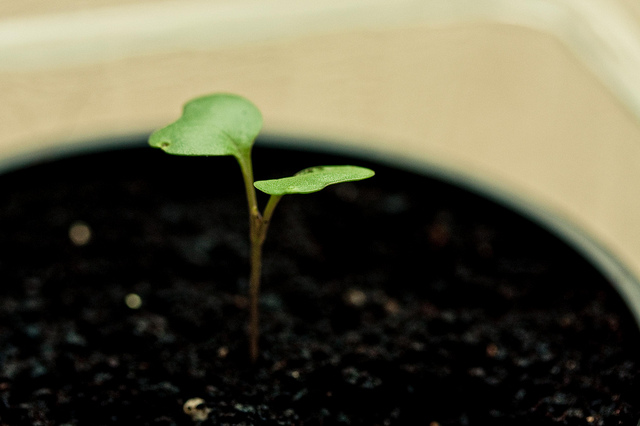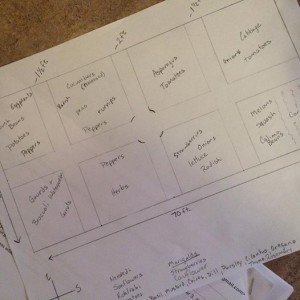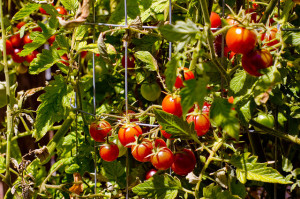We’ve always had at least a small patch of dirt to grow our tomatoes, our peppers, maybe a green bean or two. Last year we added cucumbers because JJ was determined to make a good clausen pickle – and he got very close. We’ve experimented with greens and broccoli, here and there. So, we’re not garden newbies.
Our new-to-us, for-nearly-one-year house came with a massive garden space. The plot had already been dug a few years ago, though when we moved in, it remained vacant. Last year we had to rely on farmer’s markets for anything fresh, and it would be an understatement to say that JJ’s disappointment in BLT season was massive.
So, this year we’re upping our game. Not only are we filling that vacant spot in the backyard, we’re starting it ourselves. That’s right. We’re growing from seed. And not just any ol’ seed packet from 3 years ago. We ordered heirloom packets from Baker Creek. We don’t mess around, no, we don’t mess around, nuh-uh. We purchased a few starter pots and a grow light, because we lack a good western-facing window.
We had the kids fill the little pots with the fluffy organic soil and I carefully doled out a few seeds per pot, and marked them with painters tape on the cup, because we lacked foresight to buy those little stick-things, and – let’s face it – the odds of those being removed and used as a weapon runs pretty high in this house.
And then, we waited. And waited. Finally our onions (yes, onions! He thought he was getting starts, but no) gave us tiny slivers of green poking through the dirt. And then the tomatoes! We moved from the hotpad-prepped table to the light table. We even have alarms going off each morning and evening to remind us to water and move the pots around.
This growing stuff is serious business. We’re leaving overnight and have a little bit of concern about our sprouts. We check them regularly, and every time we see a new little stem, we celebrate. Right now, it’s a tad unfathomable what it will be like to pick a tomato that came from a plant that started as this teeny-tiny seed. There’s a certain amount of miracle, not only in our ability to keep these things alive, but in their inherit ability to grow and produce and to feed.
JJ said last night, “and just think about next year, after we collect the seeds from our own harvest and save them, and then start them again next year.” I think it’s akin what grandparenting might be like – watching this thing you grew, produce again and again. You’re not at all in control, yet, without you, this life would cease to exist as we know it. We’re not the source. We can’t even “make” anything grow. Yet we’re vital to the entire process.
Of course, someone else, somewhere else, is growing perfectly “fine” little cherry tomatoes and banana peppers. We could always just let them do it. We can continue to go to the store and buy our imported romas, twice the size of the normal (because we Americans like everything “bigger and better”) and be on our merry little way. Leaving it to the professionals is always an option.
When we continue to outsource, we don’t have to rearrange our lives. We don’t have to water and weed and pluck. And, for sure, you’re able to steer clear of the heartache of a bad season, a diseased favorite purple pepper, or the frustrations of a bug infestation. We can absolutely bypass the work of growth by buying it ready made. This is always an option.
So why do it? And, as with gardening, so with life. Marriage, children, starting – or even working – a business. Why toil, strain and love?
I. Don’t. Know.
Except to say that in the process of growing something else, we reap a new kind of nourishment, one reserved for those who dig in wholeheartedly. This cannot be described with words, only by eating a tomato fresh from your garden. Or watching your child hit his first home run. Or standing beside your spouse as she accepts her Citizen of the Year award. Or hearing from a customer how you made her wedding the most beautiful day of her life. Or delivering yet another healthy baby. Or finding a donor to fund a cause that will change lives. Or helping someone find a home that will keep their family safe and warm, a respite from the world. Or helping a child write their first “book.”
There’s no reason to put in the hard work, other than the fact that hard work – whether it be with plants or people – blossoms and feeds you. It’s beautiful.
Obviously, I’m not mandating that every single person in the world must buy packets of seeds and set watering timers. This is simply our most recent peek into blessings of putting in the hard work. It helps me to answer the “why.” Why we don’t watch a ton of TV. Why we opt to bake bread instead of letting McDonalds fry it for us. Why we rearrange schedules so we can be with friends. Why we move to a small town for a lesser-paying job in exchange for nearby family.
We do hard things because they are good. Perhaps even better than easy things. Hard things give us a new sense of life and the enjoyment of it. There’s a certain beauty at discovering the connection between your soul and the rest of the universe. With a little love and attention, we can be a part of the process of creation, not just the consumption.
“Very truly I tell you, unless a kernel of wheat falls to the ground and dies, it remains only a single seed. But if it dies, it produces many seeds.” (John 12:24)



